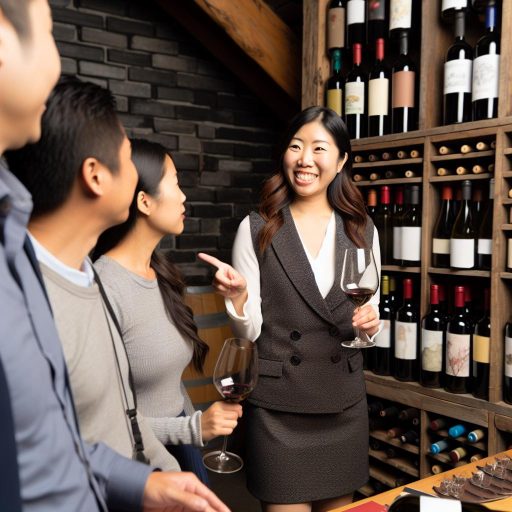The Role of Sommeliers in Enhancing Guest Experience
Creating Unique Dining Experiences
Sommeliers elevate dining experiences through their expert knowledge of wine.
They select beverages that enhance the flavors of each dish.
Consequently, guests enjoy a more immersive culinary journey.
Personalized Recommendations
Guests appreciate personalized wine recommendations tailored to their preferences.
Sommeliers engage with patrons to understand their tastes and expectations.
This connection encourages a more enjoyable dining atmosphere.
In turn, guests feel valued and cared for throughout their meal.
Wine Pairing Expertise
Knowledgeable sommeliers provide guidance on ideal wine pairings.
They understand the nuances of different varietals and regions.
This expertise ensures that each sip complements the meal perfectly.
Additionally, thoughtful pairings enhance the overall dining experience.
Enhancing Menu Appeal
Collaborating with chefs, sommeliers refine menus to focus on wine synergy.
Their input helps create cohesive dishes well-suited to specific wines.
As a result, menus become more dynamic and appealing to guests.
Educating Guests
Sommeliers also educate guests about wine, enriching their dining experience.
Many are eager to share stories behind each bottle and vineyard.
This knowledge fosters appreciation for the complexities of wine.
Ultimately, it transforms a simple meal into an unforgettable experience.
Creating a Welcoming Atmosphere
By promoting a warm and inviting environment, sommeliers enhance guest comfort.
They engage with patrons and encourage questions about the wine list.
This interaction builds camaraderie, enhancing the overall guest experience.
Encouraging Exploration
Sommeliers invite guests to explore different wines and styles.
This exploration broadens their palates and encourages adventurous choices.
Guests often leave with new favorite wines and memorable experiences.
The Importance of Wine Knowledge in Food Pairing
Enhancing Guest Experience
Wine knowledge significantly enhances the overall dining experience.
Unlock Your Career Potential
Visualize a clear path to success with our tailored Career Consulting service. Personalized insights in just 1-3 days.
Get StartedGuests often seek recommendations to complement their meals.
Effective pairings elevate the flavors of both food and wine.
This synergy creates a memorable experience for diners.
Understanding Flavor Profiles
Sommeliers possess a deep understanding of flavor profiles.
They can identify the nuances in both wine and food.
For instance, a sommelier knows how acidity balances richness.
This knowledge helps in making informed pairing choices.
Practicing Artful Recommendations
Sommeliers provide tailored wine recommendations.
They consider personal preferences and dietary restrictions.
This personalized approach enhances satisfaction and enjoyment.
Additionally, it encourages guests to explore new flavors.
Supporting Culinary Creativity
Wine pairings invite chefs to be more creative.
A well-selected wine can inspire new menu items.
Collaborative efforts between chefs and sommeliers produce exceptional results.
This teamwork highlights a restaurant’s offerings and strengths.
Importance of Seasonal Pairings
Wine selections must adapt to seasonal menu changes.
Sommeliers ensure the wine list aligns with fresh ingredients.
This adaptability reflects attention to detail and care.
Ultimately, it maximizes the dining experience throughout the year.
Educating Staff and Guests
Sommeliers play a crucial role in educating staff about wine.
They facilitate training sessions for better knowledge retention.
Informed staff can then pass this knowledge to guests.
Additionally, sommeliers may host tastings to engage diners.
Such events cultivate a deeper appreciation for wine.
Sommeliers as Educators: Teaching Staff and Guests
Enhancing Staff Knowledge
Sommeliers play a crucial role in training restaurant staff.
They share their expertise on wine varieties and food pairings.
This knowledge empowers staff to provide excellent service.
By educating them, sommeliers help create a memorable guest experience.
Moreover, staff confidence increases with proper training.
Consequently, they engage with guests in informed discussions.
Engaging Guests in Wine Education
Sommeliers also serve as informative resources for guests.
They help guests select wines that enhance their meals.
Through tastings, sommeliers introduce guests to new flavor profiles.
This interaction enriches the dining experience for everyone.
Guests often leave with a deeper appreciation for wine.
Additionally, sommeliers help demystify wine selections.
Offering Personalized Recommendations
Personalized recommendations are a hallmark of a skilled sommelier.
They consider individual guest preferences and dietary restrictions.
This individualized service fosters a welcoming atmosphere.
As a result, guests feel valued and understood.
Once engaged, guests are more likely to return.
Trust builds between guests and establishments through these interactions.
Discover More: How to Master Multitasking as a Concierge
The Financial Impact of a Skilled Sommelier on Restaurant Revenue
Enhancing Wine Sales
A skilled sommelier significantly boosts wine sales in a restaurant.
Their expertise allows for elevated recommendations that match the menu.
Additionally, they can introduce patrons to premium wines they might overlook.
This personalized approach increases customer satisfaction and loyalty.
Creating Memorable Experiences
Memorable dining experiences often lead to repeat business.
Sommeliers enhance meals with curated wine pairings that complement flavors.
This attention to detail transforms a standard meal into a delightful event.
Moreover, satisfied customers are likely to share their experiences through word-of-mouth.
Training and Staff Development
Investing in a skilled sommelier pays off through staff training.
They educate servers about wine selections and pairing techniques.
This creates a knowledgeable team that can confidently make recommendations.
Ultimately, well-trained staff contribute to improved sales across the board.
Cost Management and Pricing Strategy
A sommelier plays a vital role in strategic pricing for the wine menu.
They analyze market trends and customer preferences to optimize offerings.
This ensures that the restaurant maintains competitive pricing and profitability.
Furthermore, an expert sommelier can identify cost-effective purchasing opportunities.
Building Relationships with Suppliers
Strong relationships with wine distributors are crucial for success.
A sommelier’s network provides access to exclusive wines and pricing advantages.
These relationships often lead to better deals and timely deliveries.
This results in a well-stocked bar and an appealing wine selection for customers.
Gain More Insights: Challenges and Rewards of the Casino Host Profession
Trends in Wine Selection: How Sommeliers Keep Up
Understanding Current Trends
Sommeliers continuously analyze the evolving wine landscape.
They pay attention to consumer preferences and industry changes.
With this knowledge, they curate relevant and exciting wine lists.
Adapting to New Palates
Recent years have seen a diversification of taste preferences.
Modern consumers often seek unique, lesser-known varietals.
Sommeliers embrace this trend by exploring new regions and styles.
Incorporating Sustainable Practices
Many guests now value sustainability in their dining choices.
Sommeliers, therefore, pursue organic and biodynamic wines.
They highlight producers who prioritize eco-friendly practices.
Leveraging Technology
Technology plays a crucial role in wine selection today.
Apps and software streamline inventory management and trends analysis.
This allows sommeliers to quickly adapt their selections based on data.
Engaging Guest Experiences
Creating memorable experiences is key for sommeliers.
They often host tastings to educate and delight wine lovers.
Furthermore, they offer personalized pairings to enhance meals.
Explore Further: Educational Requirements For Spa Managers

Sommeliers and Sustainability: Promoting Eco-Friendly Choices
The Role of Sommeliers in Sustainable Practices
Sommeliers play a crucial role in promoting sustainability within the hospitality industry.
They help educate consumers about environmentally friendly wine choices.
Moreover, they liaise with wineries that prioritize sustainable farming practices.
Through their expertise, sommeliers can curate wine lists that reflect these values.
Encouraging Local and Organic Options
Sommeliers often advocate for local and organic wines.
By supporting local vineyards, they reduce carbon footprints associated with transportation.
Additionally, organic wines often avoid harmful pesticides and fertilizers.
This choice benefits the environment and supports local economies.
Building Awareness of Eco-Friendly Labels
Many wines feature eco-friendly certifications and labels.
Sommeliers inform guests about these certifications, enhancing informed choices.
They can explain what organic, biodynamic, and sustainable certifications mean.
This provides patrons with the knowledge to make responsible selections.
Incorporating Sustainability into Wine Pairings
Sommeliers skillfully create pairings that emphasize sustainable ingredients.
They can suggest dishes that use seasonal and locally sourced products.
This contributes to a farm-to-table approach, reducing environmental impact.
Furthermore, these pairings often enhance the dining experience.
Future Trends in Sustainable Wine Selection
The trend towards sustainability in wine selection continues to grow.
Guests increasingly demand information about the wines they consume.
As a result, sommeliers must stay informed on the latest sustainable practices.
They also need to adapt their selections to reflect consumer interests.
Discover More: How Sommeliers Select Wines for Fine Dining
The Cultural Significance of Wine in Hospitality
The Role of Wine in Culinary Experiences
Wine enhances culinary experiences across many cultures.
It elevates flavors and complements dishes beautifully.
Many chefs collaborate with sommeliers to create ideal pairings.
This enhances the dining experience for guests significantly.
Historical Context of Wine in Society
Wine has deep roots in many civilizations throughout history.
From ancient Rome to modern Europe, wine signifies celebration.
It plays a crucial role in cultural and religious ceremonies.
For instance, wine is intrinsic to social gatherings and rituals.
Social Interactions and Community Building
Wine fosters social interactions among patrons in hospitality venues.
Sharing a bottle creates a sense of community and connection.
Wine tastings and events encourage collaboration and communication.
These experiences often turn strangers into friends.
The Economic Impact of Wine Culture
The wine industry contributes significantly to the economy.
It creates jobs in production, distribution, and hospitality.
Furthermore, wine tourism boosts local economies and businesses.
Regions known for wine attract visitors seeking unique experiences.
Future Trends in Wine and Hospitality
The future of wine in hospitality looks promising and innovative.
Trends like organic and sustainable wines are gaining popularity.
Moreover, technology influences how sommeliers engage with guests.
For example, digital wine lists and apps enhance customer experiences.
The Future of the Sommelier Profession in the Digital Age
Embracing Technology
The role of sommeliers is evolving rapidly.
Technology is reshaping how they operate.
For instance, mobile apps now support wine selections.
These tools assist sommeliers in providing personalized recommendations.
This enhances the overall dining experience for patrons.
Integration of Artificial Intelligence
Artificial intelligence is becoming increasingly important.
Sommeliers can leverage AI for data analysis.
This enables them to understand customer preferences better.
AI also assists in predicting wine trends in the market.
Consequently, sommeliers can curate more appealing wine lists.
Educational Opportunities
Online learning platforms are transforming sommelier education.
Individuals can now access courses from leading experts worldwide.
This diversification improves the skills of aspiring sommeliers.
Moreover, remote learning allows greater flexibility.
As a result, more candidates enter the profession.
Connecting with Customers
Social media offers sommeliers unique engagement tools.
They can share insights and recommendations online.
This interaction fosters deeper connections with customers.
Additionally, sommeliers can build personal brands through platforms.
This amplifies their reach beyond traditional restaurant settings.
The Importance of Adaptability
The hospitality industry continues to change dynamically.
Sommeliers must adapt to these shifts to remain relevant.
They need to stay updated with emerging wine trends.
Flexibility enhances their ability to serve diverse clientele.
Ultimately, adaptability is key to long-term success.
Additional Resources
The Problem With Tea Sommeliers — Kill Green
Sommelier (Part-time On Campus) – School of Business & Hospitality




